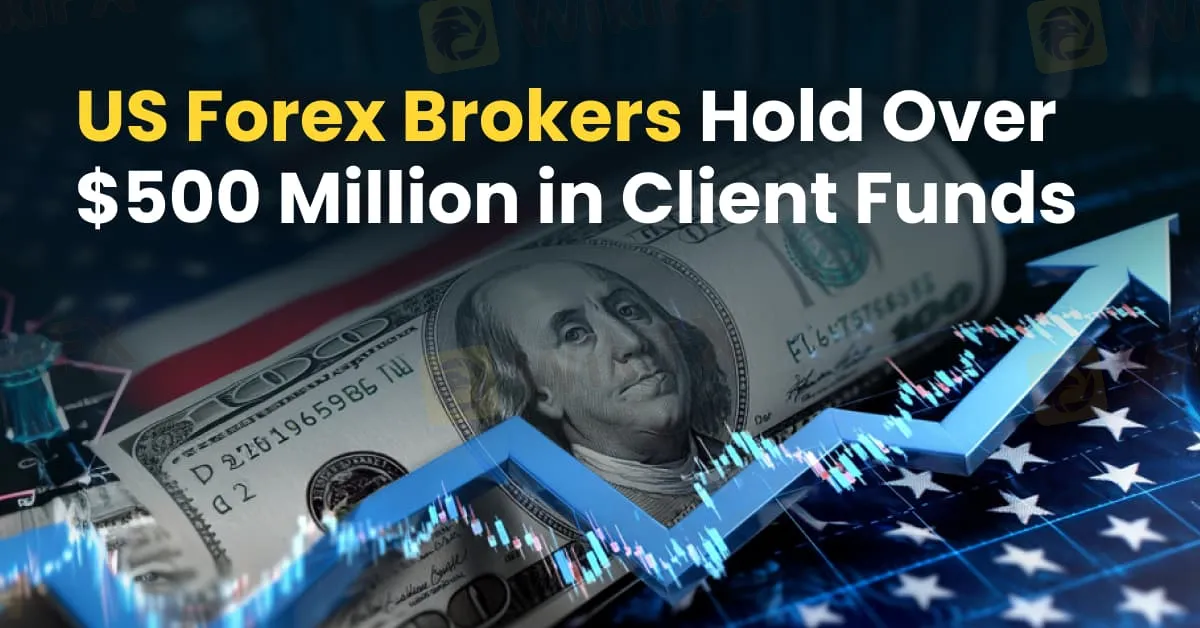US Forex Brokers Hold Over $500 Million in Client Funds
Abstract:According to report, U.S. retail forex brokers collectively held approximately $527 million in client funds as of February 2025—a figure representing a 2.9% increase from January’s total of around $512 million, according to the latest regulatory data released by the Commodity Futures Trading Commission (CFTC).

According to report, U.S. retail forex brokers collectively held approximately $527 million in client funds as of February 2025—a figure representing a 2.9% increase from Januarys total of around $512 million, according to the latest regulatory data released by the Commodity Futures Trading Commission (CFTC). Despite the monthly growth, the current level marks a 2.9% year-over-year decline when compared with February 2024, highlighting both recent momentum and long-term market challenges.
Market Dynamics and Concentration
The U.S. retail forex market remains notably concentrated. The top three brokers—Gain Capital, Oanda, and Charles Schwab—hold a commanding share, collectively managing over 85% of client funds. This concentration is largely attributable to substantial regulatory barriers. For example, the industrys stringent requirements, including a minimum capital threshold of $20 million for forex dealers, have solidified the position of established players, effectively limiting the entry of new competitors.
Gain Capital Takes the Lead
Among the leading players, Gain Capital has maintained its strong market position with an impressive 42.7% share of the total client funds. As of February 2025, Gain Capital held about $225 million in client deposits. This figure not only represents a 6% month-over-month increase from January but also reflects a 7% year-over-year growth compared to February 2024. The consistent upward momentum at Gain Capital underscores its resilience and the trust it commands among U.S. forex traders.
Regulatory Landscape
According to the CFTC filing, all six registered retail foreign exchange dealers (RFEDs) operating in the U.S.—namely Gain Capital, Oanda, Charles Schwab, IG US, Interactive Brokers, and Trading.com—continue to exceed the regulatory minimum capital requirements. These capital buffers are designed to safeguard client funds and maintain market stability, ensuring that financial risks remain contained in an inherently volatile trading environment.
The monthly compilation of financial reports from futures commission merchants (FCMs) and RFEDs serves as a key indicator of market health and regulatory compliance in the forex sector. The sustained collection of these reports aids in monitoring market practices and enhancing investor protection measures across the industry.
Conclusion
While the slight increase in client funds from January to February 2025 is a positive signal of short-term market strength, the overall decline compared to February 2024 suggests that U.S. retail forex brokers continue to face long-term pressures. The combined impact of stringent regulatory requirements and market concentration presents a double-edged sword, fostering both stability and competitive challenges. Nonetheless, with market leaders like Gain Capital demonstrating robust performance, the outlook for U.S. forex brokers remains cautiously optimistic as they strive to balance regulatory compliance with the demands of an evolving market landscape.

Read more

Account Deleted, Funds Gone: A New Broker Tactic to Beware Of?
The main trading dashboard account of a trader for LQH Markets was completely deleted by a broker. The trader is not being offered any access to their funds or profits. This incident shows the risks of trading markets and brokers and the importance of protecting your funds without relying on any broker.

PrimeXBT Expands Trading Options with Stock CFDs on MT5
PrimeXBT launches stock CFDs on MetaTrader 5, offering shares of major U.S. companies with crypto or USD margin for enhanced multi-asset trading.

Broker Comparsion: FXTM vs AvaTrade
FXTM and AvaTrade are two well-established online brokers offering forex and CFD trading across global markets. Both enjoy strong reputations and high ratings on WikiFX—FXTM holds an AAA overall rating, while AvaTrade scores 9.49/10, indicating they’re regarded as reliable choices by the community. However, since brokers have great reputation in the industry, how do we know which one is more suitable for individuals to invest in? Today's article is about the comparison between FXTM and AvaTrade.

Webull Listed on Nasdaq Following SPAC Merger with SK Growth
Webull and SK Growth complete their business combination, with Webull now trading under the ticker “BULL.” App hits 50 million downloads worldwide.
WikiFX Broker
Latest News
Love, Investment & Lies: Online Date Turned into a RM103,000 Scam
Broker’s Promise Turns to Loss – Funds Disappear, No Compensation!
Broker Took 10% of User's Profits – New Way to Swindle You? Beware!
Pi Network: Scam Allegations Spark Heated Debate
Broker Comparsion: FXTM vs AvaTrade
Account Deleted, Funds Gone: A New Broker Tactic to Beware Of?
El Salvador and U.S. Launch Cross-Border Crypto Regulatory Sandbox
The Instagram Promise That Stole RM33,000
StoneX Subsidiary, Gain Global Markets Bermuda, Penalized for Trading Misconduct
Kraken Partners with Alpaca to Offer U.S. Stocks and Crypto
Rate Calc
